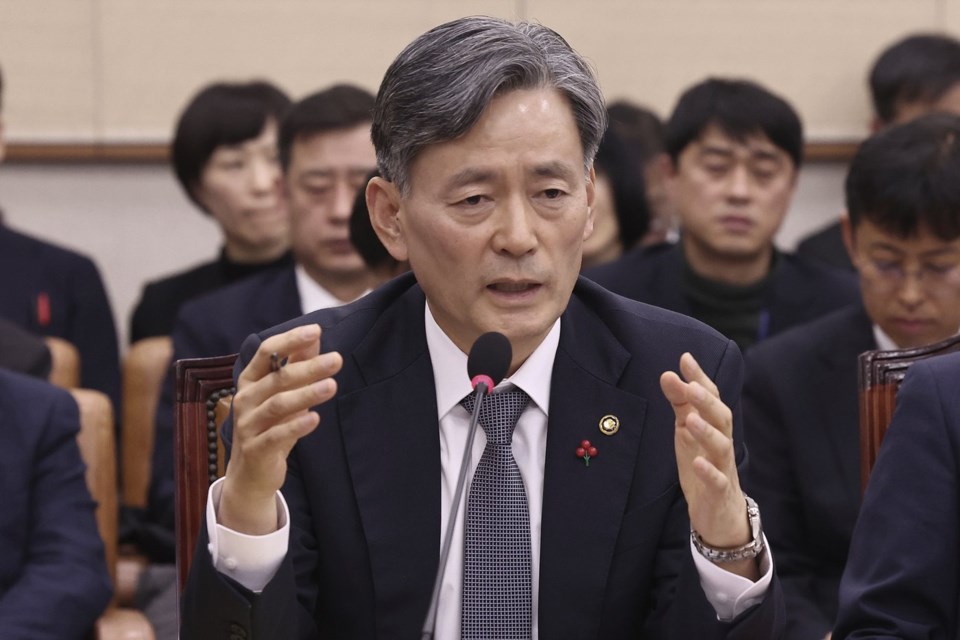SEOUL, South Korea (AP) — South Korea’s previous defense minister was stopped from attempting suicide while in detention over last week's martial law, officials said, as police were trying to search President Yoon Suk Yeol’s office Wednesday in their intensifying investigation.
The main liberal opposition Democratic Party also plans to submit a new motion to impeach Yoon for his Dec. 3 declaration that imposed martial law in South Korea for the first time in more than 40 years. Its first impeachment attempt against Yoon last Saturday failed, with ruling party lawmakers boycotting a floor vote.
Yoon’s ill-conceived power grab has paralyzed South Korean politics, frozen its foreign policy and rattled financial markets, greatly reducing his chances of completing his five-year term and casting a turbulent shadow over one of Asia’s most robust democracies.
Shin Yong Hae, commissioner general of of the Korea Correctional Service, told lawmakers Wednesday that Kim tried to kill himself the previous night at a detention center in Seoul. He said that Kim's suicide attempt failed after center officials stopped him and that he is in a stable condition now.
At the same parliament committee meeting, Justice Minister Park Sung Jae confirmed Kim’s failed suicide attempt.
Kim was arrested early Wednesday after a Seoul court approved a warrant for him on allegations of playing a key role in a rebellion and committing abuse of power. Kim became the first person formally arrested over the Dec. 3 martial law decree.
Kim, one of Yoon’s close associates, has been accused of recommending martial law to Yoon and sending troops to the National Assembly to block lawmakers from voting on it. Enough lawmakers eventually managed to enter a parliament chamber and they unanimously rejected Yoon’s decree, forcing the Cabinet to lift it before daybreak on Dec. 4.
Prosecutors have up to 20 days to determine whether to indict Kim.
Later Wednesday, National Police Agency Commissioner General Cho Ji Ho and Kim Bong-sik, head of the metropolitan police agency of the capital, Seoul, were detained over their actions during martial law, police said. They were accused of deploying police forces to the National Assembly to block lawmakers' voting together with troops.
The country’s main law enforcement institutions are focusing on finding whether Yoon, Kim and others involved in imposing martial law committed the crime of rebellion. A conviction on the charge of rebellion carries a maximum death sentence.
South Korean police said they sent officers to search Yoon's office on Wednesday to look for any evidence related to the martial law introduction. Local media reported the search was underway, but police and the presidential office couldn't immediately confirm the reports.
Some observers earlier said the presidential security service won’t likely permit searches of Yoon’s office, citing a law that prohibits searches of sites with state secrets without approval from those in charge of those areas.
Yoon on Saturday apologized over the martial law decree, saying he won't avoid legal or political responsibility for the declaration. He also said he would leave it to his party to chart a course through the country’s political turmoil, “including matters related to my term in office.”
In his martial law announcement, the conservative Yoon stressed a need to rebuild the country by eliminating “shameless North Korea followers and anti-state forces,” a reference to his liberal rivals who control parliament. Since taking office in 2022, Yoon has had near-constant friction with the Democratic Party, which introduced motions to impeach some of his top officials and launched a political offensive over scandals involving Yoon and his wife.
Opposition parties and many experts say the martial law decree was unconstitutional. They say a president is by law allowed to declare martial law only during “wartime, war-like situations or other comparable national emergency states” and South Korea wasn’t in such a situation. They argue that deploying troops to seal the National Assembly to suspend its political activities amounted to rebellion because the South Korean Constitution doesn’t allow a president to use the military to suspend parliament in any situation.
During a parliamentary hearing Tuesday, Kwak Jong-keun, commander of the Army Special Warfare Command whose troops were sent to parliament, testified that Yoon called him and asked for the troops deployed at parliament to “quickly destroy the door and drag out the lawmakers who are inside.” Kwak said he didn't implement Yoon's order.
At the same hearing, senior officer Kim Dae-woo of the military’s counterintelligence agency said his commander, Yeo In-hyung, asked him if an army bunker in Seoul had space to detain politicians and other figures after martial law was imposed. Yeo is considered a close associate of Kim Yong Hyun.
If Yoon is impeached, his presidential powers would be suspended until the Constitutional Court decides whether to restore his powers or remove him from office. If he is dismissed from office, a new presidential election would be required.
The leader of Yoon’s conservative party pledged to arrange his stable exit from power, saying the party will coordinate with Cabinet members over state affairs and that Yoon will be sidelined from duties during a transition to an early election.
However, the plans have been widely criticized as unrealistic and unconstitutional. The constitution explicitly states that impeachment is the sole method for suspending presidential powers and that the authority to command the military rests solely with the president. The Defense Ministry said this week that Yoon remains in charge of the country’s military forces.
Kim Tong-hyung And Hyung-jin Kim, The Associated Press

